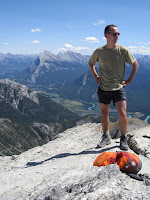 There is something inevitably depressing about returning to work after a holiday, no matter how much one enjoys one’s job. Despite the consolations of cheery colleagues, I’m relieved to be working from home today – a kind of half way stage – tackling the backlog in my email inbox: that tax on taking any time off. This experience always prompts the thought: what’s so special about holidays? Why can one not live as though on permanently on holiday?
There is something inevitably depressing about returning to work after a holiday, no matter how much one enjoys one’s job. Despite the consolations of cheery colleagues, I’m relieved to be working from home today – a kind of half way stage – tackling the backlog in my email inbox: that tax on taking any time off. This experience always prompts the thought: what’s so special about holidays? Why can one not live as though on permanently on holiday?I’ve returned from walking in the Canadian Rockies. Such First World outdoor orientated holidays fit a now well established template. In town: looking for decent coffee shops, nice pizza, the odd book or cd shop and micro-brewery beer. In the (nearby) country: day walks (rather than backpacking so as to allow opportunity for micro-brewery beer and pizza) up appealing mountains with perhaps some occasional bike or kayak hire.
On this trip, however, I realised that whilst that holiday template has been constant for some years (across, eg, several previous visits to Canada), my everyday life has itself increasingly converged on it. In other words, weekends, at least, involve the same goals of coffee, pizza, microbrewery beer and some decent hill walking, or a spin on the bike.
This is in part the result of general cultural changes in the UK. The Seattle Coffee Company – a UK chain – arrived as the first chain coffee shop whilst I lived in Leamington and by the time I left there were more than 20 in the town. Pizza Express, joined by Ask and Zizzi (again, Leamington had all three) have spread throughout the country even, finally, reaching Kendal. There has been a revolution in micro-brewing in the UK (there are 24 in Cumbria)…
(In the 1990s, if national breweries manufactured only tacky lager, microbreweries, encouraged by recent US legislation, provided an alternative. The antecedent is false in the UK – well, England – but the recent rise of microbreweries provides a kind of interesting local value.)
…But it also reflects my own relocation (to just outside the Lake District National Park).
Now, such convergence seems rational. It would be odd if the values expressed whilst on holiday were utterly distinct from those expressed during the rest of one’s life. That would be a kind of alienation of one's everyday state. But it does force the question of why the two kinds of set of otherwise the same practices seem so distinct from one another. One would never confuse them. I begin to think that there’s a kind of holism about holidays. Things simply have different meanings when away. In the context of a holiday, the practices have a different resonance. At the same time, the holiday just is the sum of the practices.
